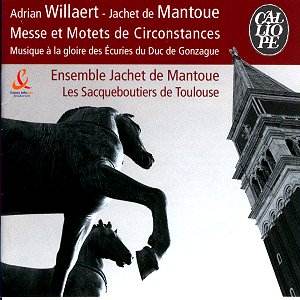Jachet (or Jacquet) of Mantua and Adrian
Willaert (or Adriano Cantore as he generally
signed himself) had strangely parallel
lives. Both trained in Northern Europe
(Willaert was Flemish, Jacquet a Breton)
and both ended up in positions of influence
in Italy at roughly the same period.
Willaert was maestro di capella of St.
Mark’s Venice from 1527 to 1562 and
Jachet maestro di capella of the Cathedral
in Mantua from 1526 to 1559. We know
that they met in Ferrara when Jachet
worked for the d’Este family there.
That they were friends is indicated
by their joint publication of a book
of double-chorus psalms, ‘Salmi at uno
et duoi chori’.
Two of the Psalms from
this collection, Psalm 125 (In convertendo)
and Psalm 126 (Nisi Dominus) are included
in this disc from the French ensemble
Jachet de Mantoue and the sackbuts and
cornets of Les Saqueboutiers de Toulouse.
The Ensemble Jachet de Mantoue is a
five-man group consisting of counter-tenor,
two tenors, baritone and bass and they
are joined by the soprano Anne Magouet.
The motets on the disc
reflect the need for such composers
to write works in tribute to their patrons
and employers. In both ‘Inclite Sfortiadum
princeps’ and ‘Victor io, Salve’, Willaert
uses a cantus firmus in praise of the
Sforza family who commissioned the motets.
Jachet’s motet ‘Enceladi Coeique soror’
rather oddly praises the Gonzaga Duke
of Mantua’s horses. It is this motet
on which Jachet based his Mass, ‘Missa
Enceladi Coeique soror’, presumably
for some unspecified court event. This
mass forms the centre-piece of this
disc. Based on the fact that Jachet’s
motet ‘Hesperiae ultimae’ was written
for the celebrations surrounding the
visit to Mantua of Prince Philip of
Spain (later King Philip II), the disc
is designed to be a speculative reconstruction
of a mass given for Philip; as such
Jachet’s parody mass celebrating the
Gonzaga stables would seem appropriate.
The Willaert motets
‘Inclite Sfortiadum princeps’ and ‘Victor
io salve’ are given in purely instrumental
versions. This reflects a significant
aspect of this disc; the voices and
instruments are mixed and matched. four
items are performed by voices alone,
two by instruments alone and the remainder
are by voices and instruments. Whilst
16th century musicians could refer to
a group of instruments and singers as
a choir, mixing a small group of voices
with cornets and sackbuts raises issues
of balance. As recorded on this disc,
the sackbuts and cornets tend to dominate
when performing with the voices. This
might not bother everyone, but I found
that I wanted to hear the voices dominate
the instruments more. This balance issue
means that the singers’ diction is occluded
and it is hard to follow the texts that
they are singing. This is a shame, as
each group when performing separately
is entirely admirable and the size of
forces used is, in theory, perfect for
this music. I have one other stylistic
quibble, the upper voices sing in a
slightly mannered way, squeezing out
the notes. Again this is a personal
preference and might not annoy everyone.
This disc has an attractive
and intelligently put together programme,
allowing us to explore two composers
who tend to occupy just the fringes
of our musical consciousness. The shame
is that stylistic issues mean the performances
are less than ideal, but the disc is
worth exploring all the same.
Robert Hugill


